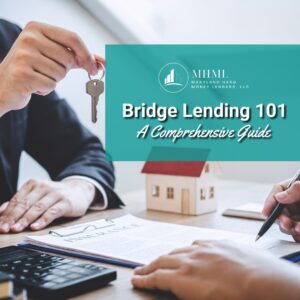Best Types of Real Estate Loans for Investment Properties in 2023
Becoming a real estate investor is a great way to earn passive income and build wealth. However, how you fund your purchase is extremely important, as it affects the size of the investment and the rate of return. In addition, with rising interest rates, it’s essential to research your options and discover the best types of real estate loans for your next investment. Read along as we go over different loan types and how to use them for your investment property.

Contents of This Article:
- What Is an Investment Property Loan?
- Should You Use a Loan for an Investment Property?
- Best Types of Real Estate Loans
- Find a Local Lender to Fund Your Investment
What Is an Investment Property Loan?
An investment property is a home you buy to generate rental income or fix and flip for profit. An investment property loan is essentially just how it sounds–money you borrow to purchase an investment property. However, investment property loans differ from owner-occupied mortgage loans since they carry more risk. As such, loan rates and terms will vary.

While most homebuyers are limited to conventional mortgage loans or similar loan types, real estate investors have more loan options. However, not all loan options are suitable for your investment type. As such, it’s important to research the different types of real estate loans to decide what will give you the best rates and returns.
Whether you’re an investor or Baltimore hard money lender, it’s essential to know different ways to fund real estate. So, before we discuss various loan options and their pros and cons, let’s go over whether or not it’s necessary to take out a loan for an investment property.
Should You Use a Loan for an Investment Property?
Taking out a loan to buy an investment property is necessary for most investors. After all, many investors, especially beginners, don’t have the cash lying around to buy a property outright. So, they must resort to borrowing money from lenders or other investors.
Using the money of others to make income with an investment property is one of the largest benefits of real estate investing. After all, you can temporarily borrow money for the investment and start earning income immediately. Once your loan is paid off, you can reap the benefits of short-term rental income and long-term property appreciation. First, however, finding a loan that fits your investment goals is important. For instance, you’ll need to consider the following:

- Loan Type
- Terms and Fees
- Interest Rates
- Structure of the Loan
- The Financing Institution
Ultimately, these factors play a huge role in your rate of return on investment properties. Additionally, the type of loan you use may affect the stability and feasibility of your rental business. After all, you could have the best property on the block, but if you can’t afford to pay the mortgage, you could end up in foreclosure.
Researching loan types and performing a property analysis before borrowing money is an excellent start to earning income with real estate. Here are some of the best types of real estate loans to consider for your investment property.
Best Types of Real Estate Loans
Most people assume that you can only fund real estate with a conventional mortgage loan. While that’s one of the most common options, there are several types of real estate loans to explore. Here are some to consider for your next investment.
- Conventional Mortgage Loan
- Hard Money Loan
- Private Money Loan
- Government Insured Loans
- Home Equity Loan
Conventional Mortage Loan
The main loan type that most investors use is a conventional mortgage loan. Similar to financing a home purchase, conventional investment loans are borrowed from a bank. Depending on the institution, the term, structure, and interest rate can vary.
Conventional bank loans can either be fixed-rate mortgages (FRM) or adjustable-rate mortgages (ARM). Fixed-rate loans have a set interest rate for the entire loan duration, while rates for adjustable-rate mortgages can change depending on the market.
Pros of Conventional Mortgage Loans
- Several different loan terms and structures to choose from
- Funded by trusted and reputable banks
- Longer loan terms with smaller monthly payments
Cons of Conventional Mortgage Loans
- Requires a sizable down payment, generally 20% or more
- Potentially high mortgage rates
- Minimum credit score requirement of 620 or higher
Hard Money Loan
One type of loan that homeowners don’t have access to, but investors do, is a hard money loan. Hard money loans are short-term, unconventional loans backed by private individuals or companies. Instead of using your credit score and history as collateral, they use the investment property you’re buying.
Since hard money loans have shorter terms than most other loans, they’re generally used for fix-and-flip strategies. However, there’s no restriction on which strategy you use, so you can fund a rental property as long as you can repay the loan on time.
Pros of Hard Money Loans
- Flexible down payment, credit score, and qualification requirements
- Shorter time commitment compared to a conventional mortgage loan
- Fast loan approval, usually within a few days or weeks
Cons of Hard Money Loans
- Higher interest rates than other loan options
- Potentially higher down payment requirements than other loan options
- Investment property is used as collateral, so if you can’t pay the loan, you’ll lose your investment
Private Money Loan
Private money loans are similar to hard money loans but generally don’t come from professional lenders. Instead, private money loans can be funded by other investors who have extra money and want to earn a return for lending their capital.
Investors not qualifying for bank loans often turn to private loans to fund their real estate purchases. Generally, private loans have fewer requirements, lower rates, and more flexible loan terms.
Pros of Private Money Loans
- Least structured type of loan with very flexible terms
- Loose eligibility requirements, so investors with poor credit can still buy real estate
- Qualification based on the investment property instead of financial assets
Cons of Private Money Loans
- Higher down payments and interest rates than conventional mortgage loans
- Very short loan term duration
- High-risk loans generally suitable for experienced investors with high rental income and ROI
Government Insured Loans
There are a few different types of government-insured loans for investors to explore. Two of the most common government-insured loans are FHA and VA loans.

However, while FHA and VA loans have fewer requirements than conventional mortgage loans, they generally only apply to owner-occupied properties.
However, using these loan types to invest in real estate is possible if you don’t already own a property. In that case, investors may explore house hacking, which involves purchasing a small multifamily home to live in and renting out the rest of the property to tenants.
Pros of Government-Insured Loans
- Lower or no down payments, requiring less capital to invest in real estate
- Low-interest rates, generally lower than conventional mortgage loan rates
- Fewer requirements, allowing investors to buy real estate with a credit score as low as 580
Cons of Government-Insured Loans
- Limited investing strategy options since government-backed loans must be used for a primary residence.
- Lending institutions may require a minimum credit score and down payment to obtain a government-backed loan.
- Some types have limited loan sizes, which may limit your ability to buy the property you want
Home Equity Loan
Another option to finance a new rental investment is a home equity line of credit (HELOC). This loan type is only available to homeowners that want to use the equity they have in their home to finance the purchase of an investment property.
However, a HELOC is generally more complicated than other loan options and might have stricter requirements.
Pros of Home Equity Loans
- Long repayment period, generally throughout 10 to 20 years
- No down payment is required as you’re using your own equity
- Investors may be able to deduct the interest costs of a HELOC on their tax returns
Cons of Home Equity Loans
- You must own a home to be eligible for a HELOC
- Interest rates are not fixed, so they could change with the market
- HELOCs usually require annual costs, like maintenance, transaction, and other fees
Find a Local Lender to Fund Your Investment
Once you’ve researched different types of real estate loans and found one that will work for you, it’s time to find a lender.

If you’re looking for a Baltimore hard money lender, our local experts can help! Maryland Hard Money Lenders specializes in residential hard money loans, fix-and-flip loans, bridge financing, and more.
Our local lenders can help you get the best loan rate for your investment property. So, if you’re interested in funding your investment with a hard money loan, check out our lending process and fill out an application today! Or, contact Maryland Hard Money Lenders for more information.




